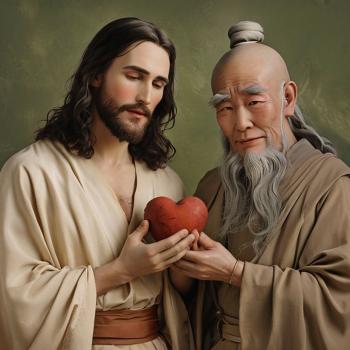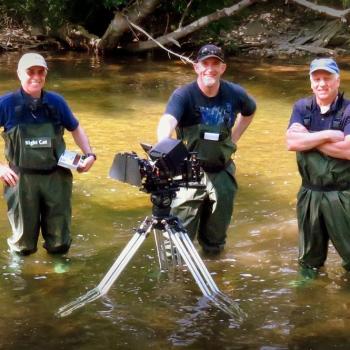Speaking of new ways of doing church, social media has been a central component of your ministry as a pastor and in your life as Moderator. You're clearly a champion of using social media and new technologies in the life of the church. How are those tools affecting denominational transformation?
While I don't take credit for much as Moderator, this is one area I will! In the past two years, under my encouragement of it, social media has blown up far more than anybody would have expected. So much so that we actually came up with a social media policy at General Assembly this year. And it wasn't a "don't do it" policy -- because that would be foolish -- but one that was "Let's use it well." I've been pushing the idea throughout my term that social media/technology is only one more tool we use to engage in ministry, nothing more, nothing less. As with any media we use to experience and express the gospel, we have to learn how to do it well.
When it comes to the foundation of the social media component, this whole "open source" understanding of people gathering together to discern the truth is actually something Presbyterians are wired for. We believe that we gather together and that nobody is supposed to have more authority than anybody else. And in an open source world, that's exactly what we do. Now we don't always live that. But what has happened is that somewhere in their souls, folks have connected with the social media component. Other than Catholics, I think Presbyterians are the most active Christians in social media at this point.
What has really been wonderful about the social media connections has been that people who stand on opposite sides of theological issues are discovering each other as people, rather than just an "issue." Social media has allowed this continuous connection and interaction (if you're up for it) that allows us to know each other more authentically. But as with any community, it's only effective when we're willing to mutually and authentically open our lives to one other. One of the positive outcomes, for example, is that when we get to General Assembly and are having heated interactions about various issues, there will be a growing number of people who know people beyond just that event and issue, or at least know people who can help soften the demonization and vitriolic nature we engage so often. So I think social media has really helped to create a better sense of community within the church.
Plus, information gets disseminated so much faster now! There were about 5,000 people watching General Assembly online every day -- that's five times more people than were actually on the floor watching it live.
So, looking forward, how is the denominational structure going to have to adapt to allow for these multiple manifestations of church you mentioned earlier?
I use the term "institutionalizing fluidity" when I talk about this. We used to create structure for a set time that would then stay there until we restructured again. So it would be chaos, chaos, chaos, breathe, breathe, breathe, chaos, chaos, chaos, breathe, breathe, breathe. We have to understand that chaos is just the air we breathe, so how does the structure keep us moving through all of that without going through these huge highs and lows? How does it provide some stability without being stifling?
I think of it like a jellyfish moving through the water -- you never know where it's going but it still holds together. When we think of institutional structures, we can't think of them as endpoints, but rather as this constant movement, which can drive people nuts. Our structure needs to have adaptability built into it, which we don't have now.
Doesn't that require a real shift in how institutional leaders lead? Is it realistic to believe that leaders will be able to make such a shift?
All things are possible in Christ! (laughter) My biggest hope for the church is that people know that something is going on, and my biggest fear is that we don't actually have the capacity to adjust. At the same time, there are a lot of young folks who are yearning again for something that is not as open as some other traditions or independent movements. There is something about the stability of a denomination, whether they would name it that or not, that says "we're going to be here every Sunday," and in a world where things are not there every week, that's a good thing. But then we can't oppress these younger folks when they come in with this structure that they have to be part of.
So what does this require for leaders? I say you're either "open source" or you're not. You can't "kind of" be open source. Worship is a great example. I think every pastor who is leading a church that is truly trying to be "open source" should cringe at least two or three times during a worship service because there will be people contributing something he or she doesn't like or understand. If you think you've crafted the perfect worship service, then you've taken away this open source kind of feel. The perfection comes from the understanding that we've all been part of its production, and not from the product.





